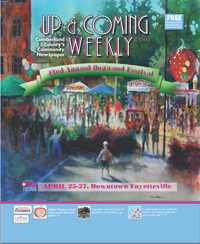 A standing committee of Fayetteville and Cumberland County lawmakers, which meets quarterly, met last week for the first time in seven months. It was the joint liaison committee’s second meeting since the fall of 2016.
A standing committee of Fayetteville and Cumberland County lawmakers, which meets quarterly, met last week for the first time in seven months. It was the joint liaison committee’s second meeting since the fall of 2016.
The group discussed the economic impact of the downtown baseball stadium now under construction. It also spoke of considering an increase in the county’s prepared food and beverage tax and the county commission’s distribution of sales tax revenues.
The future of Shaw Heights was also on the agenda as well as recovery efforts still underway in the aftermath of Hurricane Matthew, which devastated Fayetteville nearly two years ago. The committee met for an hour at city hall and seemed to agree that the issues, which involved both government agencies, can be amicably resolved.
Chamber of Commerce Executive Director Christine Michaels said a half-dozen cities that have downtown minor league ballparks have seen some economic growth nearby, especially among locally owned businesses. Deputy City Manager Kristoff Bauer told the group that construction of the stadium is on schedule and that it will be finished on time.
County Commission Chairman Larry Lancaster sought to persuade city officials that he does not anticipate a change in the sales tax revenue distribution formula that has been in effect for many years. The existing formula provides distribution of sales tax proceeds between municipalities and the county on a per capita basis.
An ad valorem property tax method could be considered, but it would significantly reduce revenues from county government to cities and towns. “I hope that as we approach this decision we don’t even let ad valorem enter the
vocabulary,” Lancaster said. It’s the first time that city council has been publicly reassured that commissioners will likely continue the existing distribution formula.

 How to resolve AdBlock issue?
How to resolve AdBlock issue? 









